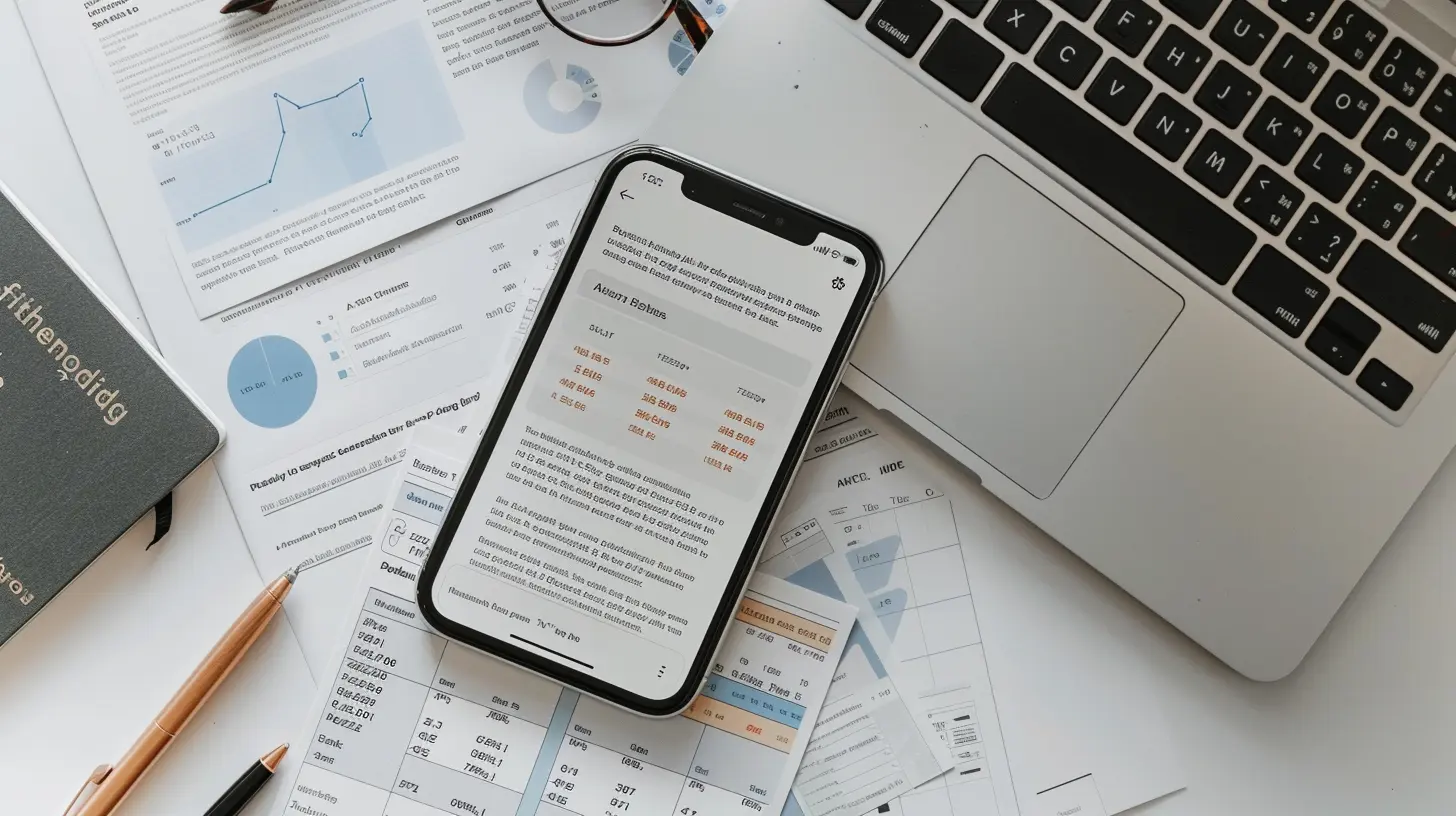The Role of Fintech in Automating Tax Filing and Compliance
2 May 2025
Let’s be honest, tax filing and compliance are probably two of the least exciting things you can think of. It’s a hassle, it's stressful, and for some, it can even feel like trying to navigate through a jungle without a map. But here's the good news: financial technology, or fintech as it's commonly called, is swooping in like a superhero to save the day.
The world of fintech is already making waves in how we handle payments, manage personal finances, and even invest. But what many don’t realize is that it’s also revolutionizing the way we deal with taxes. Yes, you read that right. Thanks to the rise of fintech, automating tax filing and compliance is becoming easier, more efficient, and (dare I say) less stressful.
Let’s dive into how fintech is transforming this once tedious process into something much more manageable.

The Overwhelming Complexity of Tax Filing
Before we get into the shiny tech stuff, let’s acknowledge the elephant in the room: taxes are complicated. Whether you're an individual or a business, filing taxes can feel like solving a Rubik’s cube blindfolded. There are forms, deadlines, tax brackets, deductions, credits... and don’t even get me started on the ever-changing regulations.Even seasoned accountants sometimes find themselves at a loss. For the average person, it’s no wonder that tax season brings a sense of dread. And when you don’t file properly? Well, that can lead to penalties, audits, or other consequences that nobody wants to deal with.
But what if I told you that there’s a way to take all that complexity, bundle it up, and shove it into a system that automatically does everything for you? This is where fintech steps in.

Enter Fintech: The Game-Changer
Fintech is at the forefront of transforming financial services, and its role in automating tax filing and compliance is no exception. The integration of cutting-edge technologies like artificial intelligence (AI), machine learning (ML), and blockchain is changing the way taxes are filed and how compliance is maintained.These technologies work together to do things like calculating tax liabilities, identifying deductions, and ensuring that all regulations are adhered to—all without the need for human intervention. Imagine having a personal tax assistant that never gets tired, never makes mistakes, and is always up-to-date on the latest tax laws. That’s fintech in action.
Let’s break down how fintech is making tax filing and compliance automation not just a possibility, but a reality.

How Fintech Is Automating Tax Filing
1. AI and Machine Learning for Accuracy and Speed
The biggest challenge with tax filing is the risk of human error. Miscalculating, missing a deduction, or misunderstanding a new tax rule can lead to costly mistakes. However, AI and machine learning can process vast amounts of tax data with pinpoint accuracy. These systems are designed to "learn" from previous filings and ensure that every calculation is spot-on.For example, fintech apps can scan through your financial records, identify eligible deductions, and apply them automatically. They can also predict how changes in income or expenses will impact your tax liability, giving you real-time insights so there are no surprises come tax season.
And the best part? This all happens in a fraction of the time it would take a human to do the same tasks. No more last-minute scrambling to file before deadlines!
2. Cloud-Based Tax Filing Platforms
Gone are the days of having to meet your accountant in person or send documents through snail mail. Thanks to fintech, tax filing can be done entirely online through cloud-based platforms. You can upload documents, review calculations, and submit your tax return from the comfort of your own home.These platforms are also designed with user-friendly interfaces, making it easy for even the most tech-averse individuals to navigate the process. Plus, cloud-based systems ensure that your data is stored securely and can be accessed at any time, from anywhere.
3. Automated Data Collection
One of the most time-consuming parts of filing taxes is gathering all the necessary documents—receipts, W-2s, 1099s, and the like. Fintech apps can integrate with your bank accounts, payroll systems, and other financial platforms to automatically collect and organize all the data you need. You no longer have to dig through piles of paperwork or spreadsheets.These systems can also update in real-time, so if you make a major purchase or get a new job, your tax filing platform will automatically adjust your records accordingly. This kind of automation not only saves time but also ensures that nothing falls through the cracks.
4. Blockchain for Transparency and Security
Let’s talk about trust. One of the biggest concerns when it comes to taxes is whether or not the system is secure. Here’s where blockchain technology comes in. Blockchain, which is essentially a decentralized ledger, ensures that all tax transactions are transparent, traceable, and secure.For businesses, blockchain can streamline compliance by creating an unchangeable record of all financial transactions. This makes it easier to track expenses, report income, and ensure that there’s no funny business going on with your taxes. It’s like having a digital watchdog that ensures everything adds up correctly.

Fintech and Tax Compliance: Making It Easier Than Ever
1. Real-Time Compliance Monitoring
Tax compliance isn't something you can just think about once a year—it’s a year-round responsibility, especially for businesses. Fintech platforms can monitor compliance in real-time, ensuring that all tax regulations are being followed throughout the year. This is particularly useful when it comes to things like sales tax, payroll taxes, and value-added taxes (VAT).By automating these processes, fintech tools ensure that you stay compliant without having to constantly worry about whether you're following the latest regulations. And if there are changes to tax laws, the system updates itself, so you’re always operating with the most current information.
2. Automated Audits
Nobody likes the word "audit," but they’re a necessary part of the tax system to ensure compliance. The good news is that fintech can help here too. Automated auditing tools can review your financial records and flag potential issues before they become problems. These tools can also make suggestions on how to correct discrepancies, giving you a chance to fix things before the IRS comes knocking.And if you are audited? Having all of your data stored digitally makes it much easier to provide the necessary documentation and explain your financial history.
3. Cross-Border Tax Compliance
For businesses that operate in multiple countries, tax compliance can be even more of a headache. Each country has its own set of tax laws, regulations, and filing requirements. Fintech tools can automate cross-border tax compliance, automatically calculating taxes owed in each jurisdiction and ensuring that all filings are completed on time.This is particularly beneficial for e-commerce businesses and freelancers who work with clients in different countries. Fintech solutions take the guesswork out of international tax laws, making it easier to comply with regulations no matter where you do business.
The Benefits of Fintech Automation in Tax Filing and Compliance
So, what’s the big takeaway here? Simply put, fintech is making tax filing and compliance easier, faster, and more accurate. Here are just a few of the key benefits:- Time Savings: Automated systems handle the heavy lifting, saving you hours (or even days) of manual work.
- Reduced Errors: AI-powered tools significantly reduce the risk of human errors, ensuring that your filings are accurate and compliant.
- Increased Security: Blockchain technology ensures that your tax data is secure and transparent, giving you peace of mind.
- Cost Efficiency: By automating the tax process, you can reduce the need for expensive accountants or tax advisors.
- Real-Time Insights: Fintech platforms give you real-time updates on your tax situation, allowing you to make informed financial decisions throughout the year.
The Future of Fintech in Tax Filing and Compliance
As fintech continues to evolve, we can expect even more advanced tools for automating tax filing and compliance. In the future, we might see AI assistants that can not only file your taxes but also negotiate with tax authorities on your behalf. Or maybe blockchain technology will become the standard for all tax transactions, creating a fully transparent and secure system for everyone.Whatever the future holds, one thing is clear: fintech is here to stay, and it’s already making tax season something we don’t have to dread quite so much.
Conclusion
Nobody likes dealing with taxes, but fintech is changing the game. By automating tax filing and compliance, fintech is making it easier, faster, and more accurate than ever before. From AI-powered systems that eliminate human error to blockchain technology that ensures transparency and security, fintech is helping both individuals and businesses navigate the complex world of taxes with ease.It’s like having a personal assistant who never sleeps, never makes mistakes, and always knows the latest tax laws. Who wouldn’t want that?
all images in this post were generated using AI tools
Category:
FintechAuthor:

Reese McQuillan
Discussion
rate this article
6 comments
Maddison Rhodes
Great article! It’s exciting to see how fintech is transforming tax filing and compliance. Automating these processes not only saves time but also enhances accuracy, making tax season much less stressful for everyone. Looking forward to more innovations in the fintech space!
May 13, 2025 at 12:10 PM

Reese McQuillan
Thank you! I’m glad you found the article insightful. Exciting times ahead for fintech and tax automation!
Ellie Castillo
Fintech significantly streamlines tax filing and compliance through automation, enhancing accuracy and efficiency. Innovative tools reduce manual effort, minimize errors, and ensure timely submissions, making tax processes more accessible for individuals and businesses alike.
May 9, 2025 at 6:50 PM

Reese McQuillan
Thank you for your insightful comment! I completely agree—fintech truly revolutionizes tax processes by improving accuracy and efficiency through automation.
Gwen McNaughton
Fintech is revolutionizing tax filing and compliance, turning a traditionally tedious process into an efficient, automated experience. By harnessing innovative technology, individuals and businesses can streamline their financial responsibilities, reduce errors, and reclaim valuable time. The future of finance is here—embrace the change!
May 8, 2025 at 6:50 PM

Reese McQuillan
Thank you for your insightful comment! I completely agree—fintech is indeed transforming tax filing into a more efficient and user-friendly process, making it easier for everyone to manage their financial obligations.
Zaid Perez
Great article! It's exciting to see how fintech is simplifying tax filing and compliance. With automation taking the hassle out of numbers, we can finally say goodbye to those tax-time headaches. Here’s to a smoother, stress-free tax season ahead for everyone!
May 8, 2025 at 12:13 PM

Reese McQuillan
Thank you for your kind words! I'm glad you found the article helpful. Here's to a seamless tax season ahead!
Zedric Bowers
Finally, a way to make tax season less painful! If only fintech could also handle my coffee addiction!
May 6, 2025 at 7:01 PM

Reese McQuillan
Glad you found the article helpful! If only fintech could brew coffee too—imagine the possibilities!
Quillan McNeil
Great insights on the transformative power of fintech in tax automation! Embracing technology not only streamlines compliance but also empowers individuals and businesses to manage their finances more effectively. Excited to see how this evolves!
May 4, 2025 at 11:34 AM

Reese McQuillan
Thank you! I'm glad you found the insights valuable. It's an exciting time for fintech, and I'm eager to see how these developments continue to enhance tax automation and financial management!
MORE POSTS

How Smart Displays Are Evolving with AI and Machine Learning

Blockchain in Logistics: Streamlining Global Trade

How to Protect Your Privacy on Smart Displays: Tips and Tools

Emerging Trends in Smart Displays and Their Impact on Daily Life

Digital Transformation in the Automotive Industry: The Road Ahead